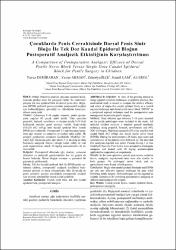Çocuklarda penis cerrahisinde dorsal penis sinir bloğu ile tek doz kaudal epidural bloğun postoperatif analjezik etkinliğinin karşılaştırılması
Abstract
Amaç: Pediatrik pratikte rejiyonal anestezi kullanımında
gittikçe artan bir yaklaşım vardır. Bu randomize
çalışma tek doz epidural blok ile dorsal penis sinir bloğunun
(DPSB) pediatrik penis cerrahide postoperatif analjezi
için kullanıldığında, güvenliği ve etkinliğinin karşılaştı-
rılması amaçlandı.
Yöntem: Çalışmaya 5–14 yaşları arasında, penis operasyonu
yapılan 60 çocuk dahil edildi. Tüm çocuklar
propofol, fentanil, sevofluran ve oksijen içinde %50 N2O
kullanarak standart genel anestezi verildi. Bupivakain
(%0.25) (0/2 ml/kg) hem kaudal epidural blok hemde
DPSB için kullanıldı. Postoperatif 24 saat boyunca hastaların
ağrı skorları ve sedasyon seviyeleri takip edildi. İlk
analjezi gereksinim zamanları kaydedildi. Modifiye Objektif
Ağrı Skalasına göre ağrı skoru 3 ya da daha az olan
hastaların analjezik ihtiyacı olduğu kabul edildi ve oral
yada suppozituvar olarak 20 mg/kg asetoaminofen ile tedavi
edildi.
Bulgular: Postoperatif dönemde ağrı skorları, sedasyon
düzeyleri ve analjezik gereksinimleri her iki grupta da
benzer bulundu. Motor bloğun uzaması ve parestezi iki
gurupta da gözlenmedi.
Sonuç: Tek doz kaudal epidural blok ile DPSB penis cerrahisini
takiben, postoperatif analjezik özellikleri bakı-
mından güvenli ve etkin yöntemlerdir. Her iki teknik de
penis cerrahisi geçiren çocuklarda postoperatif analjezi
için elverişli alternatifler olarak kabul edilebilir. Objective: In view of the growing interest in
using regional anesthetic techniques in pediatric practice, this
randomized study is aimed to compare the relative efficacy
and safety of single-shot caudal epidural block as a central
regional technique and dorsal penile nerve block “DPNB” as
a peripheral regional technique used for postoperative pain
management in pediatric penile surgery..
Methods: Sixty children ages between 5–14 years operated
on for penile pathologies were included in the study. All
included children received a standard general anesthetic
technique using propofol, fentanyl, sevoflourane and 50%
N2O in Oxygen. Plain bupivacaine (0.25%) was used for both
caudal block (0.2 ml/kg) and dorsal penile nerve block
(DPNB). During the post-operative 24 hours, pain score and
sedation level of the patients were followed up. The time that
first analgesia requried was noted. Patients having 3 or less
Modified Objective Pain Scales were accepted as inadequate
analgesia and treated with 20 mg/kg acetaminophen
applicated as suppository or suspensions.
Results: In the post-operative period, pain scores, sedation
levels, analgesic requirement rates were also similar in
both groups. No prolonged motor block and no
paraesthesia were found in both groups.
Conclusion: Single-shot caudal epidural blockade and DPNB
are safe and effective regional technique for pain relief
following penile surgery. Both techniques can be regarded as
suitable alternatives for providing postoperative analgesia in
children undergoing penile surgery.
Source
Afyon Kocatepe Üniversitesi, Kocatepe Tıp DergisiVolume
6Collections
- Makaleler [452]



















